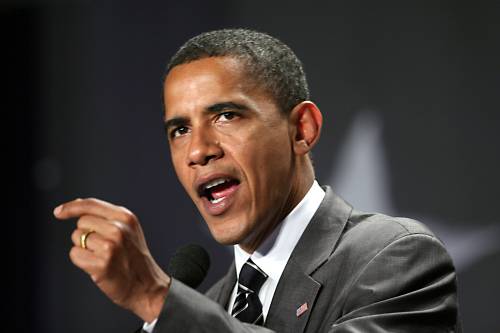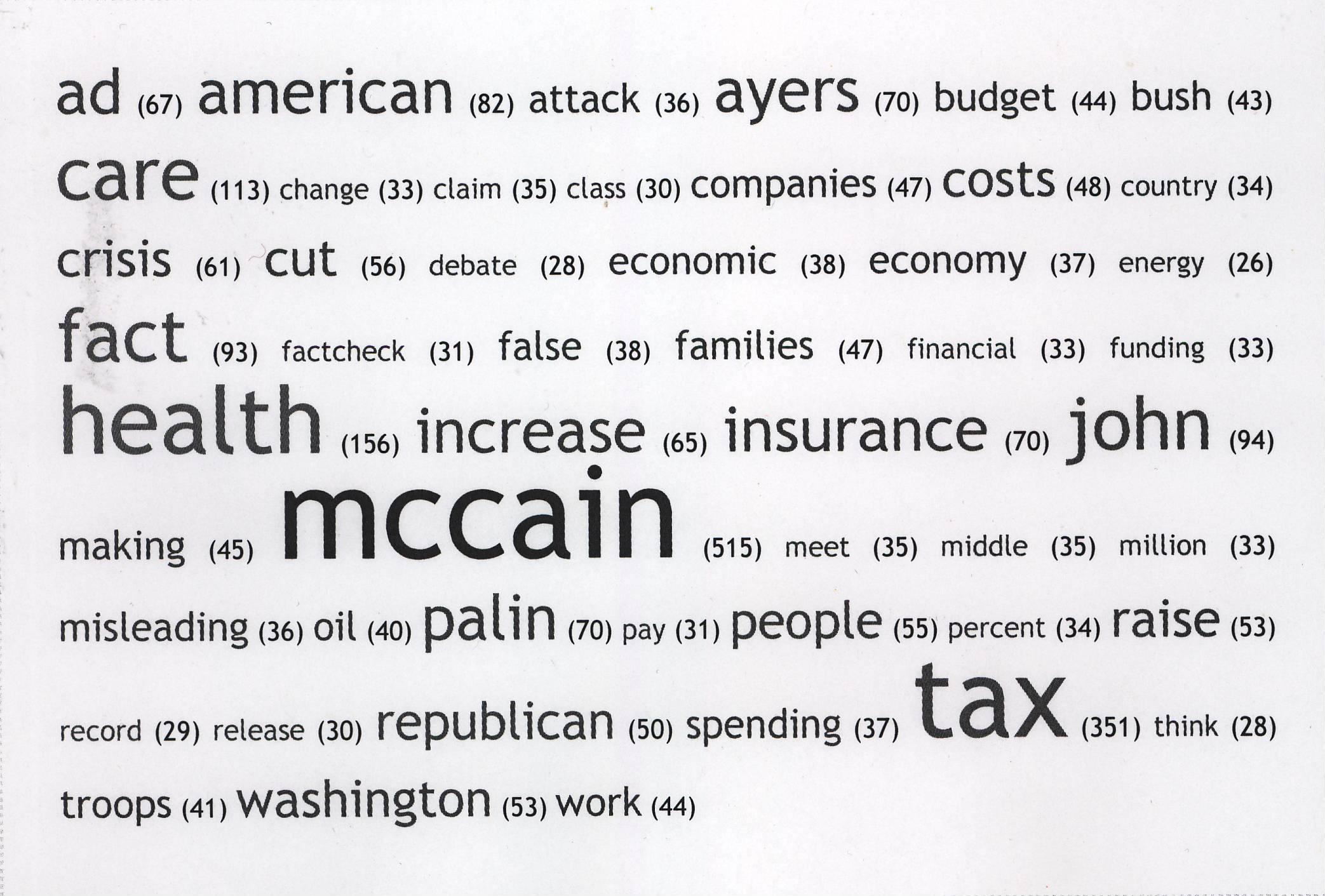Obama’s Strategic Attacks on McCain-Palin
Data from Obama’s press communications reveal a plethora of attacks on his Republican opponents. The campaign tried many tacks to shift the tide.
Jul 31, 2020776.8K Shares12.5M Views
Sen. Barack Obama (WDCpix)
It may be hard to tell from the current political chatter, but Sen. John McCain’s campaign problems are not just because of the flailing economy or because of the Republican presidential nominee’s own making. The McCain/Palin ticket is perhaps also struggling, at least in part, because of the Obama’s senior communications staff’s choreographed attack on the Arizona senator’s running mate and his domestic priorities, according to new data.
An analysis of the Obama campaign’s recent press outreach reveals that the Democratic presidential nominee’s aides focused intensely on Alaska Gov. Sarah Palin in early September — attacking her even more than McCain — and then pivoted back to focusing on the top of the ticket.
While most negative attacks risk alienatingswing voters, Obama’s aides argue their broadsides focuson McCain’s policies — as opposed to his character — without tarnishing Obama’s brand.
Illustration by: Matt Mahurin
So far, the attacks appear to be resonating without diminishing Sen. Barack Obama’s standing among key demographics. The Illinois senator’s unfavorable ratings have not broken the low 30ssince he won the Democratic nomination in May. In contrast, Sen. John Kerry’s unfavorable ratingshad hit the 40s by this time in the 2004 campaign. (McCain’s negativeshave also increased since he won the nomination.)
To quantify this strategy, I tabulated the Obama campaign’s major press releases, memos, fact sheets, as well as news articles his aides sent to national reporters — from two key periods.
One data set is from the week after the Republican National Convention, when the race with McCain was tight and politicos were buzzing about the possibility of Obama losing the election. The second data set is from the week ending Monday, Oct.6, when both campaigns were spinning two presidential debates and trading some of the sharpest attacks to date.
These word counts tell one story of Obama’s offensive.
When Palin burst on the scene with her fiery convention speech, the Obama campaign, recognizing that Palin was the story*,* tried to diminish her with a flurry of attacks. She netted more references than McCain in Obama’s press release data.
By last Monday, however, the campaign was bearing down on McCain’s domestic plans. (More after the images.)
Obama campaign press release data from Mon. Sept. 8 – Mon. Sept 15:
****
Obama campaign press release data from Mon. Sept. 29 – Mon. Oct. 6:
In September, pundits and Democratic strategists were publicly pleading with the Obama camp to stop focusing on Palin. “Ignore Palin,” saidthe armchair advisers.Instead, Obama’s press shop dug in. There were 633 references to Palin post-convention week, compared with 575 for McCain. There were another 200 references each to “bridge” (as in “nowhere”) and “Alaska” — and 100 to “earmarks.” For comparison, “change,” the Obama campaign’s mantra, clocked in fewer than 100 times in the campaign’s press release data. It was a successful effort, as I wrote at the time. (See Nervous Dems Give Obama Stupid and Redundant Advice.) Palin’s favorable ratings have since taken a hit, certainly pushed by all this tough analysis.
Lately, of course, politicos are interested in back-and-forth on Charles Keating and William Ayers — which is probably going to continue. But the recent data is striking for its focus on two other priorities: kitchen-table concerns and McCain’s credibility.
There were more than 300 combined references to health care in the recent week’s press data, and the campaign used the word “tax” a whopping 351 times — an average of 50 times a day. The topics are linked because Obama is hammering McCain for a proposed tax on employee health-care benefits.Health care has become the “good cop” in Obama’s approach to the economy. His advisers recently explained the thinking — and the polling — to The Times:
“„[a health care emphasis] resonates more than other issues for Americans who are worried about their economic condition. It is a less-threatening way to talk about the economy — showing pictures of shuttered banks, for example, could create more worry — that aides said tested well across demographic groups, but particularly among older voters who have been slower to warm to Mr. Obama.
Obama’s aides carried on another battle recently last week: McCain’s credibility. That tack has helped inoculate Obama against some Republican attacks.For example, the McCain ad criticizing Obama’s vote for a sex-education program for kindergartners largely backfired, as McCain’s Des Moines Register interviewshowed. Most people don’t believe Obama supports such a program — he doesn’t — but they do think McCain is lying about it.There were about 200 references to “false,” “fact,” “fact-check” or “misleading” in the Obama campaign’s press release data, all aimed at McCain’s credibility. That’s a sharp shift from the week in September, when three of the words didn’t break 10 references. “Fact” was used 77 times, reflecting a positive gloss and few charges of falsehoods.
Yes, press communications are only one part of a campaign’s message. TV ads, direct mail, phone-bank scripts, stump speeches and surrogate events reach more voters than the soundbites pushed on reporters each day. Some messages to the press are reinforced in ads and speeches, like the health-care focus, while others are more like fact-check missives.
A few more caveats on the data: I only counted what the campaign was pushing, not how it played. In reviewing press emails from the two weeks, I cut items that seemed minor or tangential. In the tabulations, common words, like “say” and “president,” were removed to focus on those politically salient. I did notinclude rapid-response documents sent during the vice presidential debate either, because that night was all about Palin for the Obama campaign. The rest of the week was not. Nor did the count include messages from the Democratic National Committee — or any other pro-Obama political groups making news.Finally, not every priority message must be repeated 100 times to sink in, so frequency is admittedly a limited metric.
It can still be illuminating, however, to look over the words a campaign is using in the homestretch. For Obama right now, it’s Taxing Your Health Care, Stupid.

Paolo Reyna
Reviewer
Paolo Reyna is a writer and storyteller with a wide range of interests. He graduated from New York University with a Bachelor of Arts in Journalism and Media Studies.
Paolo enjoys writing about celebrity culture, gaming, visual arts, and events. He has a keen eye for trends in popular culture and an enthusiasm for exploring new ideas. Paolo's writing aims to inform and entertain while providing fresh perspectives on the topics that interest him most.
In his free time, he loves to travel, watch films, read books, and socialize with friends.
Latest Articles
Popular Articles



